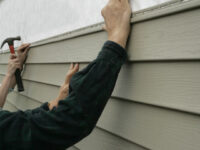What Does a Residential Plumber Do?
Residential plumbers work on piping and fixtures associated with water supply, waste removal, heating, and sanitation systems. They typically complete an apprenticeship program that mixes paid on-the-job training with classroom teachings.
Working on a commercial plumbing system can be complex compared to residential plumbing. It also requires higher insurance coverage and in-depth licensing. Contact Joe Plumber for professional assistance.
Whether it’s your clothes washer that never fills or your showerhead that turns into an anemic sprinkling device, low water pressure can greatly impact your home life. Thankfully, there are several solutions to increase the amount of water rushing through your pipes to meet your household needs and boost your energy-efficient plumbing system.
If you notice a specific faucet or fixture has low pressure, it could be an issue with the fixture itself or a clogged line or valve. In these scenarios, replacing or cleaning the fixture can usually fix the problem and restore normal water flow.
You may also want to consider contacting your municipal water supply company to report the problem. This can help ensure they are aware of the issue and are working to improve your water pressure.
Another reason for low water pressure can be a faulty shutoff valve. This can usually be located near the water meter in your home. This valve controls the water flow from the main city water line to your house and should be closed when you are not using any water in your home. If your shutoff valve is broken, leaking or seized, it will need to be replaced by a professional plumber.
You can also try to flush out your home’s water lines to remove any mineral buildup that may be restricting the water flow. This will also help to maintain proper water pressure in your home and reduce your water bills. In some cases, you may need to replace your entire pipe system with a newer, more efficient version. If you are at a higher elevation, the lower atmospheric pressure can also affect your water flow.
Optimized Water Flow
Residential plumbers can help ensure that your home’s water supply is running smoothly and efficiently. They can install and replace water heaters, fix drainage issues, and more. This can result in better water pressure throughout your home and improved efficiency when washing dishes, showering, and more. They can also prevent leaks and floods by identifying and fixing any potential problems with your plumbing before they become worse.
In residential plumbing situations, it’s common for plumbers to use CPVC or PP pipes for risers and headers, while using smaller PEX or PE-RT tubing for drops to individual fixtures. These systems are designed to provide a balance between flexibility and performance, while also offering affordable installation costs. However, it’s important to note that this type of plumbing system is not suitable for all homes and may require specialized installation techniques.
Another important function of residential plumbers is to repair and maintain sewage systems. These systems are responsible for removing waste from your home, including faeces and vomit. Therefore, they are extremely important for preventing the spread of infectious diseases.
It’s essential to find a residential plumber who is experienced in dealing with these systems, as they can identify and fix any issues quickly and effectively. They can also help you avoid costly repairs in the future by ensuring that your sewage system is working properly. Additionally, a residential plumber will be able to install and replace your toilets, tubs, and faucets to improve the overall look of your home. This can be a great way to add some extra value to your home if you decide to sell it in the future. They can also recommend the best toilets, faucets, and other fixtures for your home that will suit your personal style.
Prevent Leaks and Flooding
A residential plumber can help avoid costly repairs caused by leaks or flooding. They can also prevent health problems such as mold, and they can reduce the risk of fires by installing sprinkler systems. A professional plumber will install or repair pipes and fittings, including bathtubs, showers, faucets, garbage disposals and water heaters. They can also install or repair appliances such as washing machines, refrigerators and dishwashers.
Leaks are common and can cause significant damage if not dealt with promptly. However, most of them are easy to spot. For example, if your water meter has a reading higher than usual after you’ve used a lot of water, it might indicate a leak. In the case of a serious leak, it’s important to call an emergency plumber right away.
The same goes for floods, as they can cause severe structural damage to your home and furniture. It’s essential to have an emergency plumber in your phone contacts so you can call them when needed.
It’s best to have your plumbing system inspected and maintained regularly by a residential plumber to avoid these issues. This includes checking for potential leaking taps, toilets, showerheads and fittings underneath sinks, among other things. A plumber will also inspect the pipes to ensure they’re sturdy and free from cracks or corrosion.
Preventing leaks and floods can save you a lot of money in the long run. They can also prevent damage to your property and valuables. For instance, a plumbing leak can lead to water damage that could cost thousands of dollars to repair. In addition, it can lead to the loss of sentimental items that you might have kept in your basement or attic.
Expert Advice and Support
As the name suggests, residential plumbers specialize in working with the plumbing systems of homes. They install, repair and maintain all pipes that carry water or gas throughout the building. The work they do covers everything from interpreting blueprints and building specifications to identifying potential problems and inspecting drainage systems. A professional residential plumber can help you choose the best equipment for your needs, and ensure that all work is done safely and efficiently.
Choosing the right residential plumber is important, and you should take the time to read reviews online to find one with a good reputation. You can also ask friends and family for recommendations. Once you’ve narrowed down the options, check that your chosen plumber is licensed. You can do this by visiting the website of your local city or state government. Warner Service has a helpful guide that will show you how to confirm a plumber’s license status in your area.
You should also check whether your plumber has insurance coverage. This will protect you from any additional costs if something goes wrong during the job. A reputable plumbing contractor will have workers’ compensation and general liability insurance coverage to protect their employees in case of an accident on the job site.
Having the right plumber can improve your home’s water pressure and optimize its flow. They can also prevent leaks and flooding by identifying problems in the plumbing system. Regular maintenance from a residential plumber can also help you save money in the long run by catching small issues before they become bigger problems. In addition, a plumber can help you avoid costly damages by quickly fixing any drainage issues that may arise.
Avoid Costly Damages
The cost of hiring a professional plumber to resolve plumbing issues can save property owners the expense of major repairs or replacements down the line. Professionals have the advanced tools, expertise, and cost-efficient solutions to address issues like persistent leaks, stubborn clogs, water heater malfunctions, and more. They also offer maintenance services to help avoid plumbing disasters and extend the life of residential pipes, faucets, fixtures, and appliances.
In addition to their education and certifications, residential plumbers typically carry general liability insurance that covers the cost of associated medical expenses, property damage, and other costs that may result from accidents in the workplace. While this coverage is not required by law, it is recommended for all trade professionals.
Plumbing problems can occur at any time, and homeowners must be prepared to respond quickly when an incident occurs. This is why it is important to choose a plumber with 24/7 availability, as they can be trusted to provide prompt assistance and guaranteed solutions whenever a problem arises. Additionally, choosing a plumber with experience in the specific type of residential plumbing system you have can ensure that your repair or installation job is completed correctly the first time around.
While some issues are easier to fix than others, ignoring them can lead to long-term damage and higher utility bills. A residential plumber can help you avoid these problems by conducting regular maintenance and addressing any immediate concerns. For example, a plumber can check your home for leaks and make sure your water pressure is optimal. They can also recommend energy-efficient fixtures and appliances to reduce your energy costs. These investments will save you money and improve your comfort in the long run.






